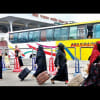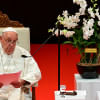Tortured Abroad: Minister plays down agonies of workers
Expatriates' Welfare and Overseas Employment Minister Nurul Islam yesterday said the number of women workers, who have recently returned after facing oppression in Middle Eastern countries, is insignificant compared to the overall number of expatriate workers there.
"If the number of workers abroad is one lakh, some 3,000 have returned," he said at a programme at Probashi Kalyan Bhaban in the capital.
At the programme, the Ministry of Expatriates' Welfare and Overseas Employment signed an annual work agreement with Wage Earners' Welfare Board (WEWB), Bangladesh Overseas Employment and Services Limited (BOESL), and Bureau of Manpower, Employment and Training (BMET).
In stark contrast to their aspirations of making a living, the female workers experienced exploitation -- physical, sexual, psychological and financial.
Some were abandoned by their employers, who threw them out of their homes. When they were found by police, they were picked up and later deported.
Not wanting to endure abuse any longer, many in Riyadh or Jeddah of Saudi Arabia decided to return home themselves and had taken shelter at safe homes managed by the Bangladesh embassy.
When the migrant workers finally returned home, empty-handed after months of ordeal, they received no support from the authorities in Bangladesh.
In many cases, their families refused to accept them back as well, owing to the associated stigma. Shunned from the only place they could go after facing such abuse on foreign land, they were worse off than before they had left.
However, the Bangladesh government does not have any data on how many women are returning home after being exploited abroad.
According to non-government organisation Brac, an estimated 4,000 such workers returned to Bangladesh last year, with many instances of it this year as well.
Nurul Islam said, "These women went to Saudi Arab illegally with the help of illicit brokers. When they were caught, they took shelter in asylum centres."
They were later sent back to Bangladesh, he said.
He added that they will take action against the brokers who sent workers abroad illegally.
Two television commercials on creating awareness on safe overseas employment were launched at the programme.
These videos will be aired during FIFA World Cup 2018.
Among others, Nomita Halder, secretary, expatriates' welfare and overseas employment ministry, Gazi Mohammad Julhash, from WEWB, Maran Kumar Chakraborty, managing director, BOESL, and Md Salim Reza, director general, BMET, were present at the programme.

 For all latest news, follow The Daily Star's Google News channel.
For all latest news, follow The Daily Star's Google News channel. 







Comments